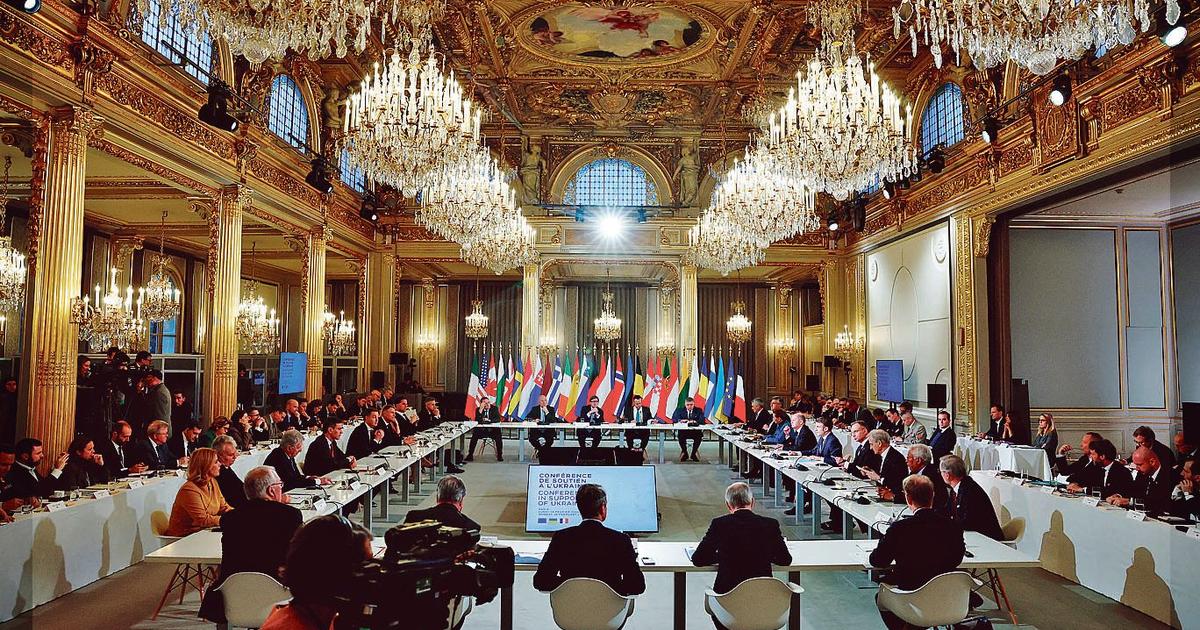Enlarge image
Chancellor Olaf Scholz (SPD): semantic caution
Photo: Eberhard Thonfeld / IMAGO
The dialogue between the vivacious journalist Christoph Heinemann and the ducking Federal Minister of Defense Christine Lambrecht, which took place this morning on Deutschlandfunk, actually reminded me of a tumbling Loriot sketch:
Christoph Heinemann: »Mrs. Minister.
Should Ukraine win this war?”
Christine Lambrecht: »We have to ensure that Ukraine is equipped in such a way that it can survive this war, that it can defend itself and that it can fight for its values, for its freedom, for its territorial independence.
And that is exactly the support we provide.
That is very important to us.
Always coordinated with our allies, with our allies.«
Heinemann: "With the aim of Ukraine winning?"
Lambrecht.: »I think it's about supporting the Ukraine now in such a way that it can survive in this fight and not about individual words.
I sometimes feel like it's more about words than actions.
We support Ukraine in this fight, that is very important, and I am in regular contact with my Defense Minister colleague.«
Heinemann: "Why don't SPD politicians get the word 'win' off their lips?"
Lambrecht: »It's about supporting and not publishing just any words.
It's about supporting.
Ukraine must be supported in this struggle in such a way that it can defend itself, that it can defend its territorial independence, but that it can also fight for our values.
That's the important thing.«
At what point does a defeat make the other a winner?
It's obvious that Lambrecht isn't answering Heinemann's question here, which is a shame because it's been on my mind for weeks: Why does the word "win" seem so forbidden in the ranks of the SPD as it is a political taboo in a game?
As a big fan of the nuances of the German language, I ask myself the almost lexicological question of when "don't lose" becomes "win" and when the defeat of one automatically becomes the victory of the other.
What difference does it make in terms of language psychology if I say "I want one side to succumb" or "I want the other side not to succumb"?
Such a discrepancy, that two interlocutors claim to mean the same thing, but do not want to say the same thing, was the most striking thing I noticed recently in one between Ralf Stegner and Norbert Röttgen in the program »Maischberger«.
In the May 24 issue, the two exchanged blows, which I'll synthesize in two sentences:
Norbert Röttgen: "My first observation is that Olaf Scholz hasn't said the sentence 'Ukraine should win'."
Ralf Stegner: "By the way, we all in the federal government subscribe to the sentence 'Putin must not win the war' and 'Ukraine must not lose it'."
Stegner didn't seem to be able to say "win" either, as if it were a Social Democrat Lord Voldemort.
What is most remarkable in this rhetorical waltz of omissions, however, is Chancellor Scholz's retreat and avoidance.
In an interview last Monday, he skilfully slipped past this in the Tagesthemen: »The goal that we all have in Europe is that Ukraine can defend its own country, its sovereignty and integrity and that Russia does not win this war. «
Speech artistic acrobatics
On Wednesday, Friedrich Merz criticized Scholz's semantic caution in the Bundestag debate and asked why he didn't just utter these simple words: "Ukraine must win this war."
This almost linguistic acrobatics, which is currently being performed by politicians, especially by the SPD, in order to evade clarity, is not without a certain bizarreness.
It seems as if these dizzy differentiation maneuvers are also an expression of the fact that one does not want to define what victory and defeat, winning and losing could mean in concrete terms.
Because when would Ukraine have won?
The minimum goal that should be achieved in order to be able to speak of a won war in military-strategic terms must be at least the withdrawal of the Russian troops, i.e. the restoration of territorial conditions to the state they were in before the invasion in February;
and with it, of course, an end to the war.
A result that can be construed as a victory would have to make it clear to Putin and other autocrats and imperialists that an invasion would never be worthwhile and would therefore always be an irrational political decision.
But that leads to a more detailed question: Doesn't that also mean not allowing any Russian military on Ukrainian territory?
It seems that people don't dare to say that Ukraine must win because, strangely enough, they shy away from publicly thinking things through and naming what Putin's defeat must look like.
Or is there even a fear that the word "win" in connection with Ukraine could be perceived by the Kremlin as too much of a provocation?
This unstable and therefore initially only asserted commitment, which dares neither in deeds nor words the necessary assignability, is basically almost consistent again: it is the linguistic extension of the rubber band-like expansion of the government's political action since the beginning of the war.
The almost bashful choice of words here becomes simply a translation of the indecisive attitude.
Accordingly, the word »win« is treated as if its use were already a verbal entry into the war, the semantic closure of airspace, a participation in the war through rhetorical unambiguousness.
In contrast, the clarity with which Foreign Minister Annalena Baerbock spoke to Markus Lanz on Wednesday was amazing.
While Scholz is currently showing himself to be both strenuous and exhaustingly reticent, Baerbock emphasized: “I say that what the Chancellor says is true.
I've said that myself very, very often.
Of course, Russia must not win this war, but must lose it strategically, because they are breaking not just one, but international law.
They want to destroy the peace in Ukraine.
That's why Ukraine must not lose under any circumstances.
That means Ukraine has to win.«
This precision is also one of the many reasons why she is currently doing so many things right as Foreign Minister.
There's just too much to lose not to talk clearly about winning.








